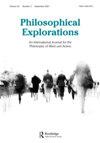On the fittingness of agential evaluations
IF 1.1
3区 哲学
0 PHILOSOPHY
引用次数: 2
Abstract
ABSTRACT According to a leading view, emotions such as admiration, contempt, pride, and shame are important vehicles of agential development. Through admiration and contempt, we establish models and countermodels against which to shape our character; through pride and shame, we get a sense of how we measure up to them. Critics of this view object that these emotions always deliver uncompromising evaluations: admiration casts people in a completely positive light, while contempt casts aspersion on them. Therefore, insofar as they lack the capacity for nuance, these emotions are systematically unfitting and misleading. This paper discusses this objection as originally formulated by John Doris as well as Macalester Bell’s response. Drawing from research on emotional intentionality, it will be argued that Doris’ and Bell’s accounts are respectively misguided criticisms and inadequate defences of these emotions. Their mistake lies in an invalid transition from the claim that these emotions are intentionally directed towards persons to the claim that they deliver global evaluations of those towards whom they are directed. By rejecting this inference, it will be shown that these emotions can deliver nuanced and fitting evaluations in a way Doris’ objection overlooks and Bell’s response precludes us from articulating.论代理评价的拟合性
根据主流观点,钦佩、蔑视、骄傲和羞耻等情绪是代理人发展的重要载体。通过钦佩和蔑视,我们建立了塑造我们性格的模式和反模式;通过骄傲和羞耻,我们感觉到自己是如何达到他们的标准的。这种观点的批评者反对这些情绪总是能带来毫不妥协的评价:钦佩会让人产生完全积极的看法,而蔑视则会对他们进行诽谤。因此,只要他们缺乏细致入微的能力,这些情绪就系统地不适合和误导。本文讨论了约翰·多丽丝最初提出的反对意见,以及麦卡莱斯特·贝尔的回应。根据对情感意向性的研究,可以认为多丽丝和贝尔的叙述分别是对这些情感的误导性批评和不充分的辩护。他们的错误在于,从声称这些情绪是故意针对个人的,到声称这些情绪对他们所针对的人进行了全球评估,这种转变是无效的。通过拒绝这一推断,我们将表明,这些情绪可以提供微妙而恰当的评价,而Doris的反对意见忽略了这一点,Bell的回应使我们无法表达。
本文章由计算机程序翻译,如有差异,请以英文原文为准。
求助全文
约1分钟内获得全文
求助全文

 求助内容:
求助内容: 应助结果提醒方式:
应助结果提醒方式:


